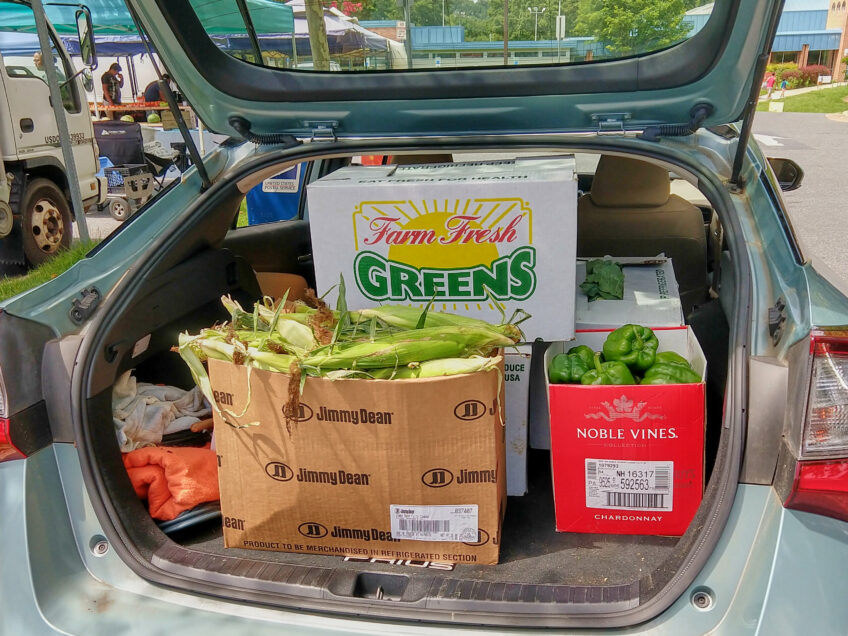Food Recovery Week, co-sponsored by the Prince George’s County Food Equity Council and supported by the Greenbelt Zero Waste Circle, will be observed October 16 to 22 in the D.C. metro area. The week-long observance is designed to promote awareness of food waste prevention and food security needs.
A series of free events will be offered both in person and virtually throughout the week that are designed for learning “easy things you can do at home and ways to support community efforts to reduce food waste and increase food security for all,” according to the Food Recovery Week website. Host organizations will offer learning and informational events that include food waste reduction, how to use leftover produce food scraps, minimizing food waste at home, composting and other topics. All events are free. A full listing of activities is available at the event website: dmvfoodrecoveryweek.org.
What Is Food Recovery?
Food recovery, also known as food rescue, is the practice of collecting edible food that would otherwise be thrown away and distributing it to local emergency food programs. About one-third of food produced in the U.S. is never eaten due to loss or waste, according to the U.S. Department of Agriculture and the Environmental Protection Agency.
Through food recovery programs, unused food is donated by grocery stores, restaurants, dining facilities, caterers, hotels, schools, farmers markets and other organizations or businesses that find themselves with excess food.
The recovered food is edible, but may not be sellable. An example is fresh produce that does not meet retailer standards for appearance, but is perfectly good to eat – sometimes called “ugly food.” Leftover food from restaurants or dining facilities is another potential source. Day-old bread is also a common donation.
Community volunteers pick up the food donations from local businesses and deliver them to food banks, food pantries, soup kitchens, shelters and other social service programs, which then distribute the food to community members in need.
Food recovery programs serve the dual function of reducing food waste and distributing good food to low-income residents with limited resources. The programs also benefit the environment by reducing food waste in landfills, resulting in an associated decrease in production of methane, a powerful greenhouse gas.
Local Efforts
In Greenbelt, food is recovered at the Farmers Market on Sundays through the efforts of volunteers working with Prince George’s County Food Rescue and powered by software from Food Rescue US, a national non-profit food recovery organization operating in more than 35 locations across the United States.
The Farmers Market food rescue is coordinated by Greenbelt Homes, Inc. resident Joe Robbins with the help of other volunteers from Prince George’s Food Rescue. Robbins and his co-volunteers make the rounds of vendors as the market closes down, focusing on farmers with extra vegetables, micro-greens and fruits. “Sometimes we’ll ask a local bakery if they have any extra bread products to donate,” adds Robbins.
There are usually two volunteers with two cars to collect food, as the donations have been very generous, according to Robbins. After collecting the food, the volunteers head to South Laurel to drop off the donations at the food bank run by the Royalhouse Chapel Church.
“My thinking is that it is worth saving the food in order to provide extra nutrition to those most in need, especially in food deserts, or in areas where food prices are very high and out of reach for those most vulnerable,” Robbins said. “Recovery is one of my core values and one of my three R’s,” he added. “If I can make a difference, then that is what I’ll put energy into.”
Prince George’s Food Rescue runs its program through a digital platform that matches food donors, delivery volunteers and emergency food programs. The platform is provided by Food Rescue US, and the platform app can be downloaded to any smart phone to easily coordinate food pickup and delivery.
Recruiting Donors
The program is actively recruiting food donors to gain increased capacity for food distribution to Prince George’s County residents in need of healthy food and to correspondingly reduce food waste going to the landfill. The advantages to businesses of being a food donor include:
– saving money through tax deductible food donations and reduced trash removal fees;
– advancing business sustainability goals by decreasing the amount of food waste that goes into the county landfill;
– providing food to community residents in need.
Greenbelt residents can recommend restaurants that may have excess food. When eating out, simply ask the server or the manager if the restaurant regularly has leftover food that gets thrown out and if they might be interested in an alternative to putting it in the trash. If so, notify Tom Taylor, the Greenbelt contact for the program, at tomtaylor0401@gmail.com, and a follow-up inquiry will be made.
Donating businesses and organizations are protected from liability by the Bill Emerson Good Samaritan Act, a federal law that protects good faith donations to nonprofit agencies. Both occasional donations as well as regularly-scheduled ones are welcome.
For more information about becoming a food donor or delivery volunteer, contact the Prince George’s Food Rescue Site Director at julia@pgcfec.org. Program staff are available to answer questions and provide support and assistance for coordinating donations and delivery throughout the county. You also may contact Taylor at the email address given above.

